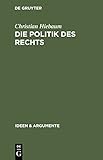Die Politik des Rechts : Eine Analyse juristischer Rationalität / Christian Hiebaum.
Material type: TextSeries: Ideen & ArgumentePublisher: Berlin ; Boston : De Gruyter, [2012]Copyright date: ©2004Edition: Reprint 2012Description: 1 online resource (403 p.)Content type:
TextSeries: Ideen & ArgumentePublisher: Berlin ; Boston : De Gruyter, [2012]Copyright date: ©2004Edition: Reprint 2012Description: 1 online resource (403 p.)Content type: - 9783110181890
- 9783110904864
- 340/.11 22
- K487.P65 H54 2004eb
- online - DeGruyter
- Issued also in print.
| Item type | Current library | Call number | URL | Status | Notes | Barcode | |
|---|---|---|---|---|---|---|---|
 eBook
eBook
|
Biblioteca "Angelicum" Pont. Univ. S.Tommaso d'Aquino Nuvola online | online - DeGruyter (Browse shelf(Opens below)) | Online access | Not for loan (Accesso limitato) | Accesso per gli utenti autorizzati / Access for authorized users | (dgr)9783110904864 |
Browsing Biblioteca "Angelicum" Pont. Univ. S.Tommaso d'Aquino shelves, Shelving location: Nuvola online Close shelf browser (Hides shelf browser)

|

|

|

|

|

|

|
||
| online - DeGruyter Widerspruch und Widerständigkeit : Zur Darstellung und Prägung räumlicher Vollzüge personaler Identität / | online - DeGruyter Wozu und wie überhaupt noch öffentliches Recht? / | online - DeGruyter Lucubrationes Philologae. Band 2, Antike und Mittelalter. | online - DeGruyter Die Politik des Rechts : Eine Analyse juristischer Rationalität / | online - DeGruyter Australia's Many Voices. Teil 1, Australian English - The National Language / | online - DeGruyter König David – Eine Symbolfigur in der Musik / | online - DeGruyter Lucubrationes Philologae. Band 1, Seneca. |
Frontmatter -- Vorwort -- Inhalt -- Einleitung -- 1. Teil: Interpretation und Zielannahmen -- 2. Teil: Vergangenheit und Zukunft -- 3. Teil: Rechte und Ziele -- Schlussbemerkung -- Literatur -- Register -- Errata
restricted access online access with authorization star
http://purl.org/coar/access_right/c_16ec
Christian Hiebaum examines the political dimension of legal argumentation. He shows how two prevalent beliefs which seem to contradict one another are, in fact, compatible: the belief that the application of law is a political undertaking, and the belief that those who apply law necessarily act in a truth-oriented manner. This demands a thorough analysis of the interpretation of legal standards on the one hand, and of the concept of common welfare and its role in legal discourse on the other. Overall, the analysis is set up as a deconstruction of Dworkin's distinction between arguments of principle and arguments of policy. In contrast to similar projects, this analysis does not flow into convenient skepticism or relativism.
Christian Hiebaum untersucht die politische Dimension der juristischen Argumentation. Er zeigt, wie sich zwei weit verbreitete Überzeugungen, die einander zu widersprechen scheinen, doch vereinbaren lassen: die Überzeugung, dass Rechtsanwendung ein politisches Unternehmen ist, und die Überzeugung, dass Rechtsanwender notwendig wahrheitsorientiert verfahren. Dies erfordert eine gründliche Auseinandersetzung mit der Interpretation von Rechtsnormen einerseits und mit dem Begriff des Gemeinwohls und seiner Rolle im Rechtsdiskurs andererseits. Insgesamt ist die Analyse als Dekonstruktion der Dworkin'schen Unterscheidung zwischen Prinzipien- und Policy-Argumenten angelegt.
Issued also in print.
Mode of access: Internet via World Wide Web.
In German.
Description based on online resource; title from PDF title page (publisher's Web site, viewed 28. Feb 2023)


